Lights, Camera, Educate! Choosing the Right Video Hosting in 2025
Video is king in online learning. Choosing the right hosting platform can make or break your course's success. As a Shopify store owner or an arts and crafts business venturing into online courses, smooth video delivery is crucial. It's key for captivating your audience and monetizing your expertise.
Lagging videos, buffering issues, and limited accessibility can quickly frustrate students and damage your brand. This is where choosing the right video hosting solution becomes essential.
Effective video hosting platforms offer more than reliable streaming and storage. They provide features tailored for online courses, such as gated content, student progress tracking, and even integrated marketing tools.
Choosing the right platform can feel overwhelming. There are a lot of options available. What pricing model suits your needs - a monthly subscription, a pay-per-view system, or a usage-based plan?
Do you need advanced analytics to understand viewer engagement? How important is integration with your existing Shopify setup or other marketing platforms?
This guide dives into the top 8 video hosting solutions for online courses in 2025, catering to various budgets and requirements. Whether you're a seasoned educator or just starting, this article will help you choose the perfect platform. You'll be able to deliver a seamless and engaging learning experience. This will boost student satisfaction and maximize your revenue potential.
1. Tevello
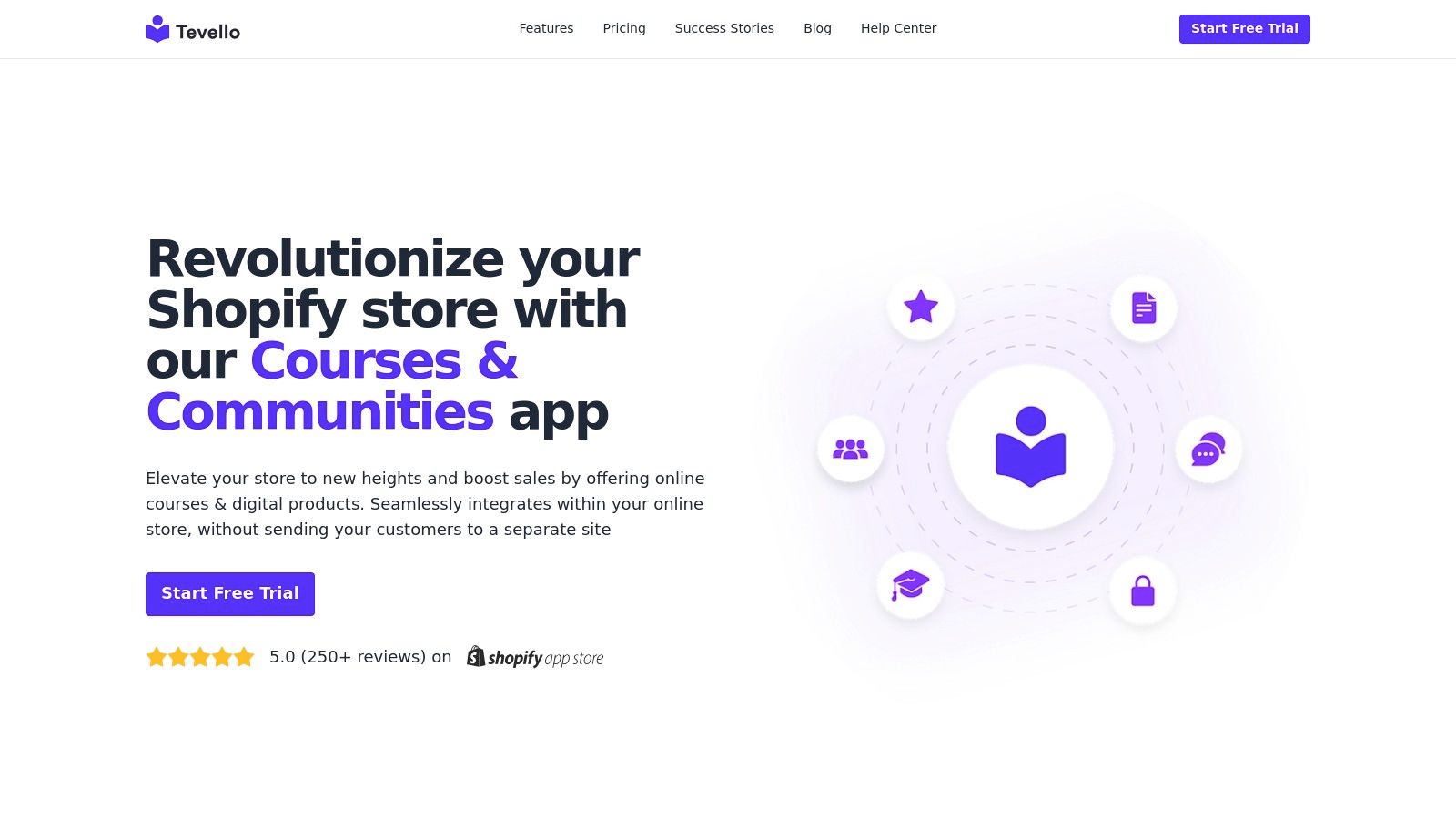
Tevello stands out as the only all-in-one video hosting platform built specifically for Shopify merchants. It’s more than just a way to deliver videos - Tevello integrates course content, video lessons, and community features directly within your Shopify store.
You can upload and host your videos directly inside Tevello, eliminating the need for third-party platforms. This makes content delivery smoother and faster for your students. Prefer to embed instead? Tevello also supports external video providers like Vimeo, YouTube, and Wistia giving you total control over how you manage and present your content.
For entrepreneurs selling physical or digital products, this opens powerful possibilities: bundle online knitting classes with your yarn kits, offer a video course alongside your planner, or include subscriber-only tutorials with your art supplies.
Tevello’s native video hosting means faster setup, better control over access, and a seamless student experience - all within your Shopify dashboard. You can customize your learning paths, set up gated content, and automate student enrollment using Shopify Flow.
Key Features & Benefits
- Built-in video hosting – Upload and organize your course videos without relying on external platforms.
- Flexible Video Hosting: Integrate with top video platforms like Vimeo, YouTube, and Wistia.
- Seamless Shopify Integration: Manage everything within your Shopify store for a simplified experience.
- Automated Workflows: Automate onboarding and enrollment using Shopify Flow.
- Versatile Course & Community Features: Offer a mix of courses, memberships, and interactive workshops.
- Shopify-native: Manage everything inside your store, from sales to course access.
- Customizable Learning Paths: Tailor the learning experience to your audience.
- Multilingual Support: Reach a broader, global customer base.
Pros and Cons of Using Tevello
Pros:
- Native video hosting: no need for a third-party video service
- Flexible: Aside from it's native video hosting, Tevello allows you to use other video hosting platform of your liking
- Fully integrated with Shopify (products, customers, and payments)
- Ideal for bundling physical products with digital video content
- Offers both individual courses and recurring memberships
- Supports automation via Shopify Flow
-
Simple pricing: flat monthly fee with no hidden costs
Cons:
- Only works for Shopify stores - if you’re not on Shopify, you can’t use it.
Pricing
Tevello offers a single, all-in-one plan designed for course creators. After a 14-day free trial, pricing is a flat $29/month, with unlimited access to all features.
Tips for Implementation
- Plan your course content and learning paths before setting up Tevello.
- Explore Shopify app integrations for a more streamlined workflow.
- Utilize Tevello’s support resources and documentation.
Tevello stands out due to its unique integration with Shopify. While other platforms may offer similar features, Tevello’s focus on the Shopify ecosystem simplifies the entire process. This makes it a valuable asset for scaling your online business. For arts and crafts businesses, it’s an effective way to engage with customers, share expertise, and build new revenue streams.
2. Vimeo
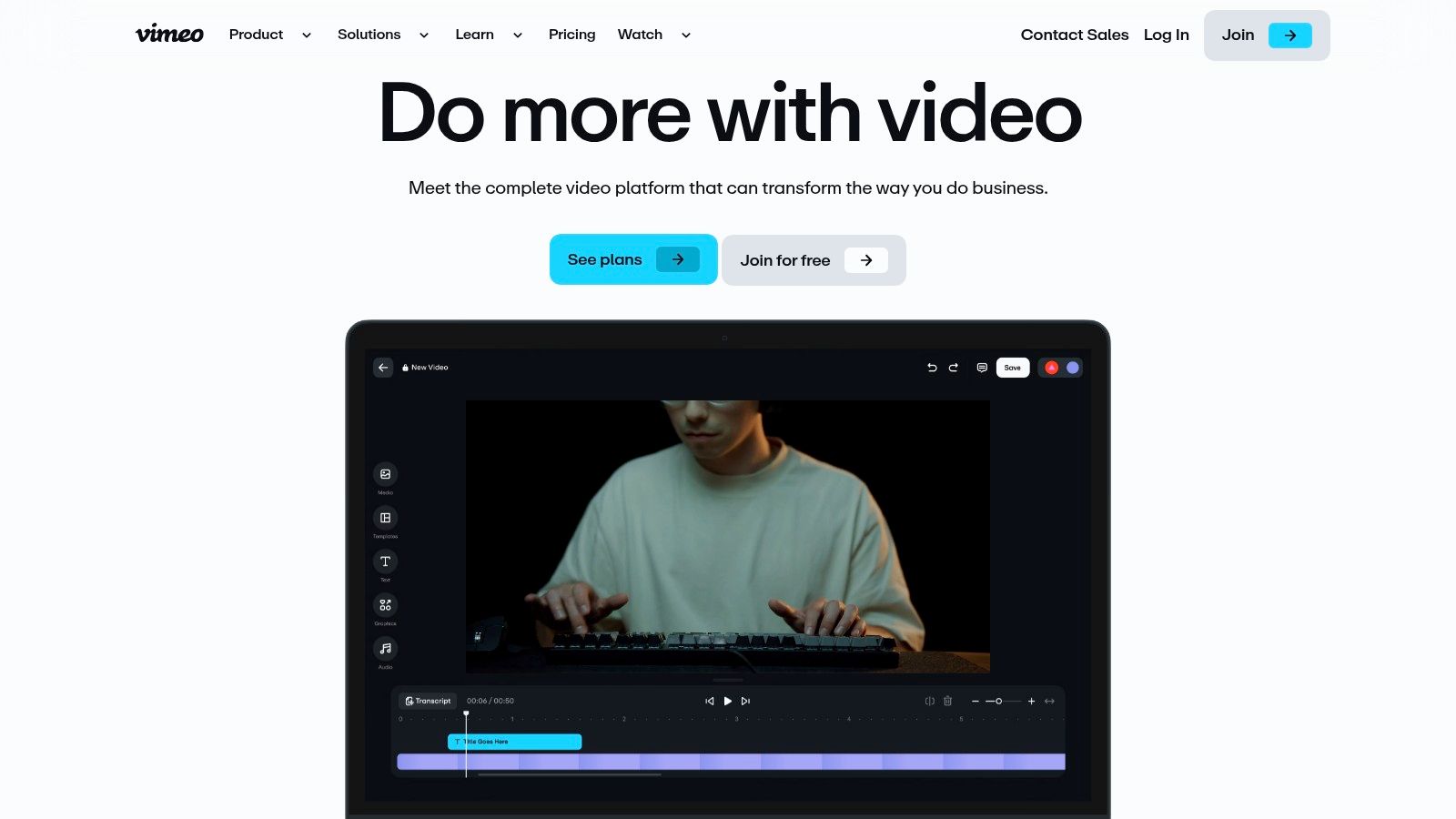
Vimeo is a professional video hosting platform perfect for Shopify store owners and arts and crafts businesses looking to showcase online courses. Unlike platforms with ads, Vimeo provides a clean, uninterrupted viewing experience, putting your content front and center. This is essential for maintaining a professional image and keeping students engaged.
Vimeo’s high-quality video playback with adaptive streaming ensures smooth viewing, regardless of internet connection speed. Its strong privacy controls, including password protection and domain-level privacy, offer peace of mind, allowing you to restrict access to paying students. This is especially useful for premium workshops or exclusive masterclasses.
For arts and crafts businesses demonstrating intricate techniques, Vimeo's high-quality streaming ensures clarity. Shopify store owners can seamlessly embed video tutorials directly onto product pages or dedicated course areas. This enhances the customer experience and has the potential to boost sales.
Features
- Ad-free video player with customization options: Brand the player to match your store's aesthetic.
- Advanced privacy controls: Control access through passwords or domain restrictions.
- Detailed analytics and engagement metrics: Track viewer behavior and refine your content.
- Team collaboration tools and review pages: Streamline feedback on videos with colleagues.
- Adaptive streaming technology: Ensure smooth playback on various devices and internet speeds.
Pros
- Professional, ad-free viewing experience: This improves your brand image and keeps students focused.
- High-quality video and reliable streaming: Ideal for showcasing high-definition instructional content.
- Robust privacy options: Protect your content and ensure it reaches paying students.
- Integration with major LMS platforms like Moodle and Canvas. Expand your reach and offer a structured learning environment.
Cons
- Higher price point: While Vimeo's quality comes at a cost, it's often a worthwhile investment.
- Storage limits on lower-tier plans: Consider your storage needs when selecting a plan.
- Limited marketing tools: You might need additional marketing tools to promote your courses.
Pricing
Vimeo offers a range of plans, from free to premium. Business plans, designed for creators, start at around $50/month and include features ideal for hosting online courses. Check the Vimeo website for the most current pricing.
Implementation Tips
- Optimize video titles and descriptions: Use relevant keywords.
- Create engaging thumbnails: Capture attention and encourage clicks.
- Embed videos directly into your platform: Provide a seamless learning experience.
- Utilize Vimeo’s analytics: Track performance and refine your content strategy.
Vimeo stands out for its high-quality video playback, ad-free viewing, and robust privacy settings. It’s an excellent option for creators who value a professional presentation and want full control over their content. It's a particularly good choice for Shopify store owners and arts and crafts businesses looking to elevate their online courses and provide a premium learning experience.
3. Wistia

Wistia stands out as the video hosting platform laser-focused on marketing and turning viewers into customers. This makes it perfect for Shopify store owners and arts & crafts businesses. Wistia goes beyond simply hosting. It gives you a full set of tools to boost engagement and get leads directly from your videos. It helps transform passive viewers into active participants in your sales funnel.
Imagine owning a Shopify store selling handmade jewelry. You've created a stunning video showcasing your new collection. With Wistia, you can embed this video directly onto your product page. The player is completely customizable to fit your brand. No distracting competitor ads, just a smooth viewing experience focused on your craft.
And it gets better! Wistia's Turnstile feature lets you collect email addresses right within the video. Offer a discount or exclusive content for signing up. This captures leads while they are engaged with your product. It's like having a built-in email list builder in your video content. For arts & crafts businesses offering online workshops or tutorials, this is a powerful way to build a community and advertise future courses.
Features That Make Wistia Unique
- Customizable Video Player: Match your player to your Shopify store or website for seamless branding.
- Heatmaps: See precisely how viewers interact with your videos – where they stop watching, what they rewatch, and more. This data helps you improve your content for maximum impact.
- In-Video CTAs, Forms, and Annotation Links: Guide traffic directly to product pages or sign-up forms from within the video.
- A/B Testing for Thumbnails: Optimize your video thumbnails for higher click-through rates.
- Turnstile Email Capture: This feature changes the game for lead generation.
- Robust API: Integrate Wistia with your marketing tools and CRM for smoother workflows.
Pros
- Detailed analytics show you exactly how viewers behave.
- Smooth integration with marketing platforms makes automating your workflows easy.
- Focus on conversions, with tools designed to drive sales.
Cons
- The pricing might be too high for some smaller businesses.
- Mastering the advanced features takes time.
- Storage limits vary by plan.
Pricing
Wistia has a free plan with limited features. Paid plans begin at $19/month. For the latest pricing, visit their website.
Technical Requirements
Embedding Wistia videos is simple. Just copy and paste the embed code into your website or Shopify store.
Comparison
While platforms like Vimeo and YouTube offer basic video hosting, Wistia’s focus is on marketing and conversion features. If your main goal is lead generation and driving sales from your videos, Wistia is a smart investment.
Implementation Tip
Experiment with the Turnstile feature. Offer a great incentive for signing up, and track your conversion rates. Check the heatmaps to understand viewer behavior and optimize your video content for best results.
Wistia empowers Shopify store owners and arts & crafts businesses to use video content to drive sales, get leads, and build a loyal following.
4. Teachable
Teachable is an all-in-one platform designed for creating, marketing, and selling online courses. A key feature is its integrated video hosting, making it an attractive option for Shopify store owners and arts and crafts businesses wanting to expand their offerings and connect with their audience on a deeper level. Unlike platforms focused solely on video hosting, Teachable offers a complete ecosystem, streamlining everything from content creation to student management.
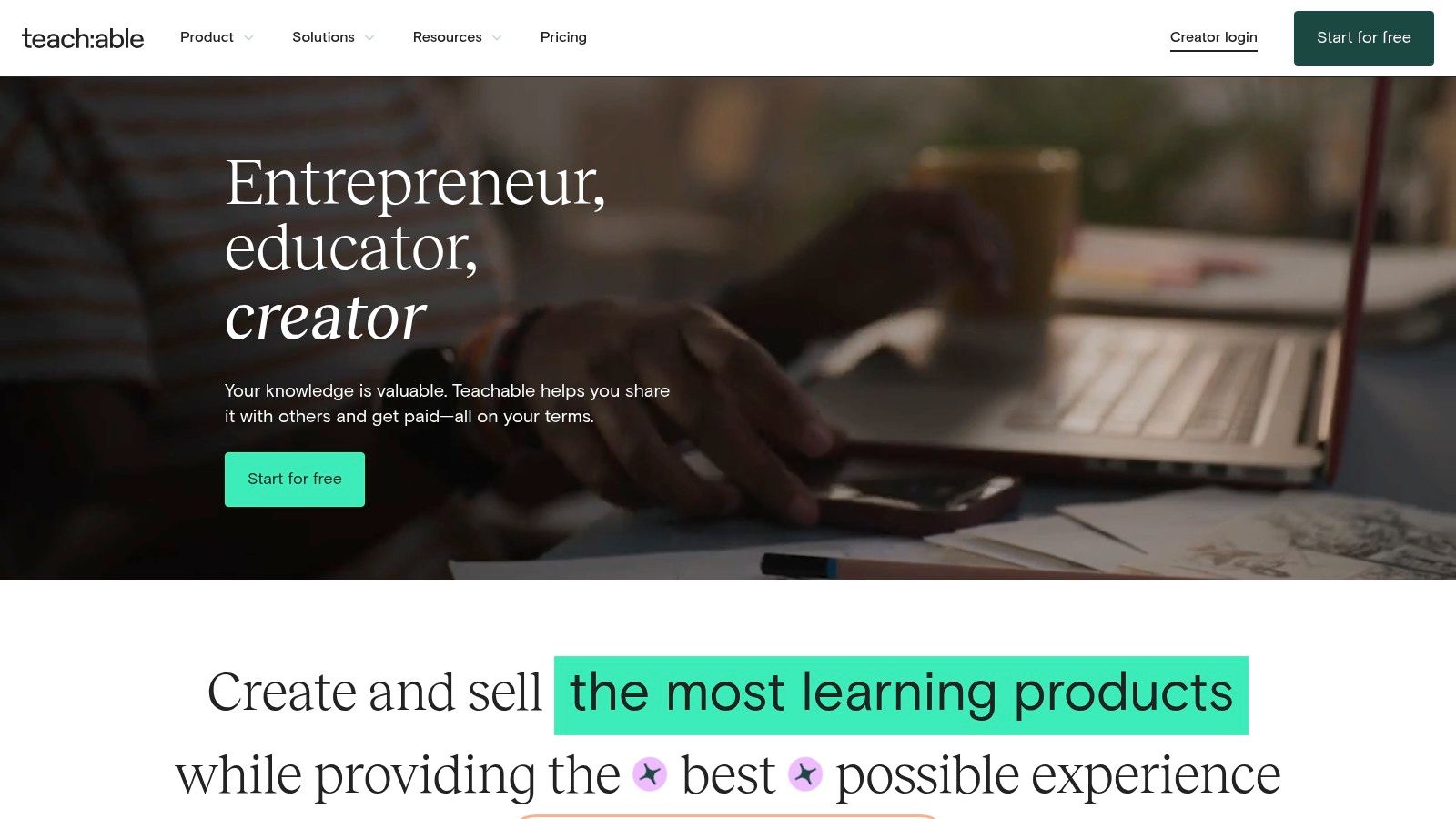
Its integrated video hosting eliminates the need for separate platforms, simplifying content organization into modules and lessons using a drag-and-drop course builder. This is especially useful for business owners managing multiple platforms who are searching for a centralized system. Imagine seamlessly integrating a course on specific techniques alongside your product listings, creating a cohesive brand experience.
For example, a Shopify store owner selling handmade jewelry could offer a course demonstrating jewelry-making techniques. This adds value for customers, increases engagement, and can potentially drive more sales. An arts and crafts business owner could create a course showcasing advanced painting skills, expanding their reach and establishing expertise.
Key features include unlimited video hosting on all plans, built-in payment processing, student management tools with progress tracking, and the ability to schedule drip content release. Drip content is particularly helpful for structuring learning experiences and keeping students engaged over time.
For tips on creating engaging learning experiences, check out this helpful resource: How To Create Engaging Online Courses: Proven Tips.
Pros and Cons of Teachable
Here’s a quick breakdown of the advantages and disadvantages:
Pros:
- All-in-one solution: No need for separate video hosting or other third-party tools.
- Built-in marketing and sales tools: Streamlines the process of promoting and selling courses.
- No transaction fees on higher-tier plans: Improves profit margins as your business grows.
- Custom domain and white-labeling options: Maintains consistent branding across your online presence.
Cons:
- Video player less customizable: Fewer customization options than dedicated video platforms like Vimeo or Wistia.
- Limited advanced video analytics: Less granular data on video engagement than dedicated analytics platforms.
- 5% transaction fees on the basic plan: May affect profitability for new businesses.
- Less flexibility for using videos outside the Teachable ecosystem: Videos are primarily for use within the Teachable platform.
Website: https://www.teachable.com
Conclusion
Teachable earns its spot on this list by offering a comprehensive and user-friendly solution for entrepreneurs looking to offer online courses. While its video features might not be as advanced as those offered by dedicated video hosting platforms, its integrated approach and business-focused tools make it a strong option for creators focused on building and scaling their online course business. Keep in mind the transaction fees on the basic plan and the video player customization limitations when making your decision.
5. Kajabi
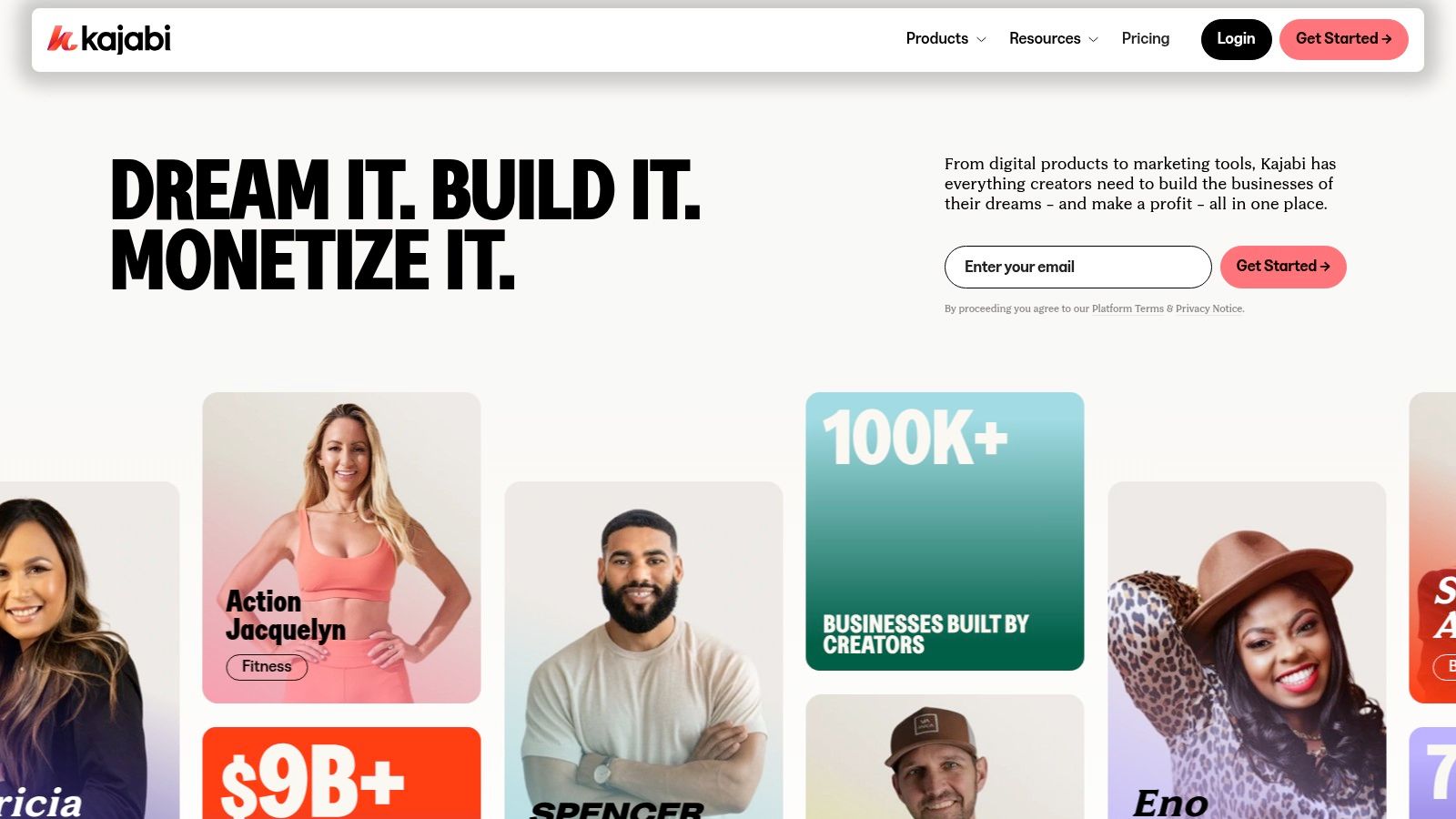
Kajabi stands out as an all-in-one platform for digital entrepreneurs, especially those building and scaling online courses. While some platforms may offer more specialized video features, Kajabi's strength lies in consolidating your business operations. This is a significant advantage for Shopify store owners and arts and crafts businesses looking to expand into educational content. Imagine easily linking product sales with online workshops, or providing exclusive tutorials as a premium add-on.
This platform manages everything from video hosting and course delivery to marketing automation and sales funnels. With unlimited video hosting within its pricing plans (ranging from $149 to $399/month), you avoid extra costs as your content and student base expands. Kajabi's adaptive video playback ensures smooth viewing across devices and internet speeds, essential for a wider reach.
Key Features and Benefits
- Built-in website builder: Course-specific themes simplify setup.
- Comprehensive analytics: Data-driven insights help inform your strategy.
- Integrated marketing automation: Email sequences and pipelines nurture leads and promote courses efficiently.
- No transaction fees: This directly benefits your profitability.
For example, a Shopify store owner selling handcrafted jewelry could host online jewelry-making courses on Kajabi. They could then promote these courses to their customers using email sequences managed within the platform, offering special discounts and package deals. An arts and crafts business could create a membership site with premium video tutorials and downloadable resources, building a community around their craft. You might also be interested in: Our guide on Kajabi vs. Teachable.
However, Kajabi's comprehensive features come at a higher price than many competitors, and its breadth of functionality can create a steeper learning curve. While it excels as a complete business ecosystem, it offers fewer specialized video features than dedicated hosting platforms like Vimeo. Developers may also find customization options somewhat limited compared to more open platforms.
Pros and Cons of Using Kajabi
Pros:
- All-in-one platform reduces the need for multiple tools.
- Advanced marketing features include email sequences and pipelines.
- No transaction fees on payments.
- 24/7 customer support.
- Unlimited video hosting.
Cons:
- Higher price point than many competitors ($149-$399/month).
- Steeper learning curve due to the extensive feature set.
- Fewer specialized video features than dedicated hosting platforms.
- Limited customization options for developers.
Website: https://kajabi.com
6. YouTube
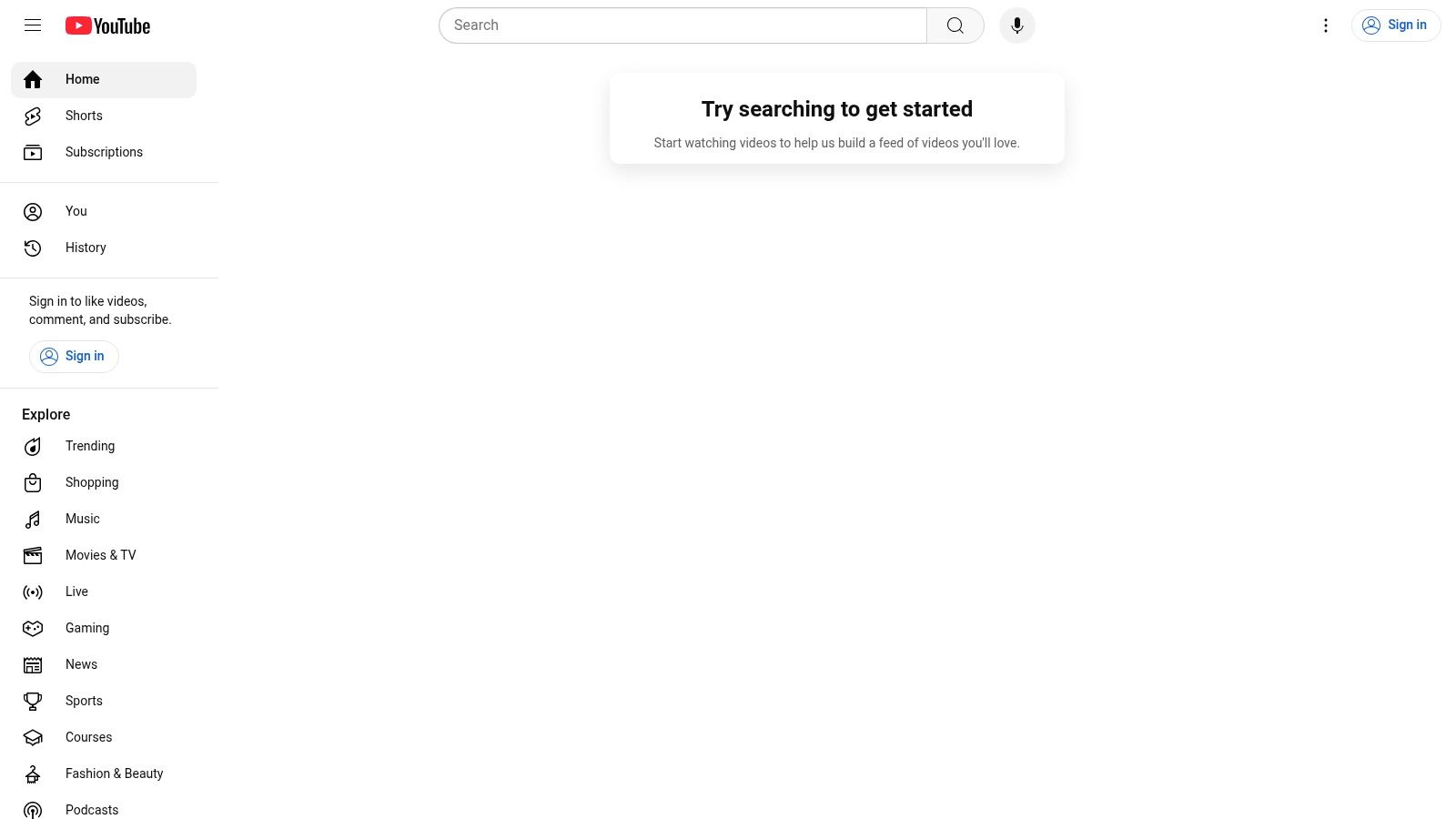
YouTube, the world's largest video platform, isn't the obvious choice for hosting online courses. However, its free and unlimited hosting, combined with its massive reach, makes it a viable option. This is especially true for Shopify store owners and arts and crafts business owners looking to grow their audience. While YouTube lacks some of the dedicated features of paid course platforms, its familiarity and ease of use are significant advantages.
Why should YouTube be considered for online courses? It offers creators an excellent opportunity for organic discovery, particularly for free introductory courses, tutorials, or supplementary product-related content.
Imagine a Shopify store owner selling handcrafted jewelry. Free YouTube videos demonstrating basic jewelry-making techniques could attract a new audience, driving traffic back to their Shopify store.
An arts and crafts business owner could similarly use YouTube to showcase their skills and promote paid workshops or online courses hosted on other platforms.
Features and Benefits
-
Free unlimited video hosting and bandwidth: This is a huge plus, especially for creators just starting out. Upload as much content as needed without worrying about storage limits or bandwidth costs.
-
Built-in audience and discovery mechanisms: YouTube's algorithm can help videos reach a wider audience, especially when optimized with relevant keywords. This can be more effective than a dedicated course platform.
-
Monetization options: YouTube's ad revenue and channel memberships can provide an additional income stream, though this might not be ideal for all courses.
-
Live streaming capabilities: Interact with your audience in real-time through live streams, Q&A sessions, and workshops.
-
Automatic transcription and captioning: This feature improves accessibility and SEO.
Pros and Cons of Using YouTube for Courses
Let's break down the advantages and disadvantages:
Pros:
- No hosting costs: YouTube is free, regardless of video size or views.
- Potential for organic reach: Tap into YouTube's vast user base.
- Familiar interface: Students are already comfortable using YouTube.
- Excellent mobile experience: Reach students on any device.
Cons:
- Limited privacy options: Videos can be unlisted (not searchable but accessible via link), but not fully private. This makes YouTube unsuitable for paid courses requiring controlled access.
- Ads: Viewers will see ads unless they use YouTube Premium, which can disrupt the learning experience.
- Less professional appearance: YouTube may not be suitable for premium or high-ticket courses.
- Content policies: Some educational topics might be restricted by YouTube's content guidelines.
Implementation Tips for YouTube Courses
- Create a dedicated channel: Keep course content separate from other uploaded videos.
- Organize videos into playlists: Playlists structure course content, making it easy for students to follow along.
- Optimize for search: Use relevant keywords in video titles, descriptions, and tags to improve discoverability.
- Engage with your audience: Responding to comments and questions helps build a community.
- Consider using YouTube Studio: This provides tools for effectively managing educational content.
Comparing YouTube to Other Platforms
While platforms like Vimeo and Thinkific offer more control over privacy and branding, they come with costs. YouTube excels when used strategically for free content designed to attract a broader audience.
Website: https://www.youtube.com
For Shopify store owners and arts and crafts business owners, using YouTube strategically can be powerful. It can help build brand awareness, attract new customers, and supplement paid courses hosted elsewhere. While not ideal for every online course, its free hosting and massive reach make it a valuable resource for content creators.
7. Thinkific
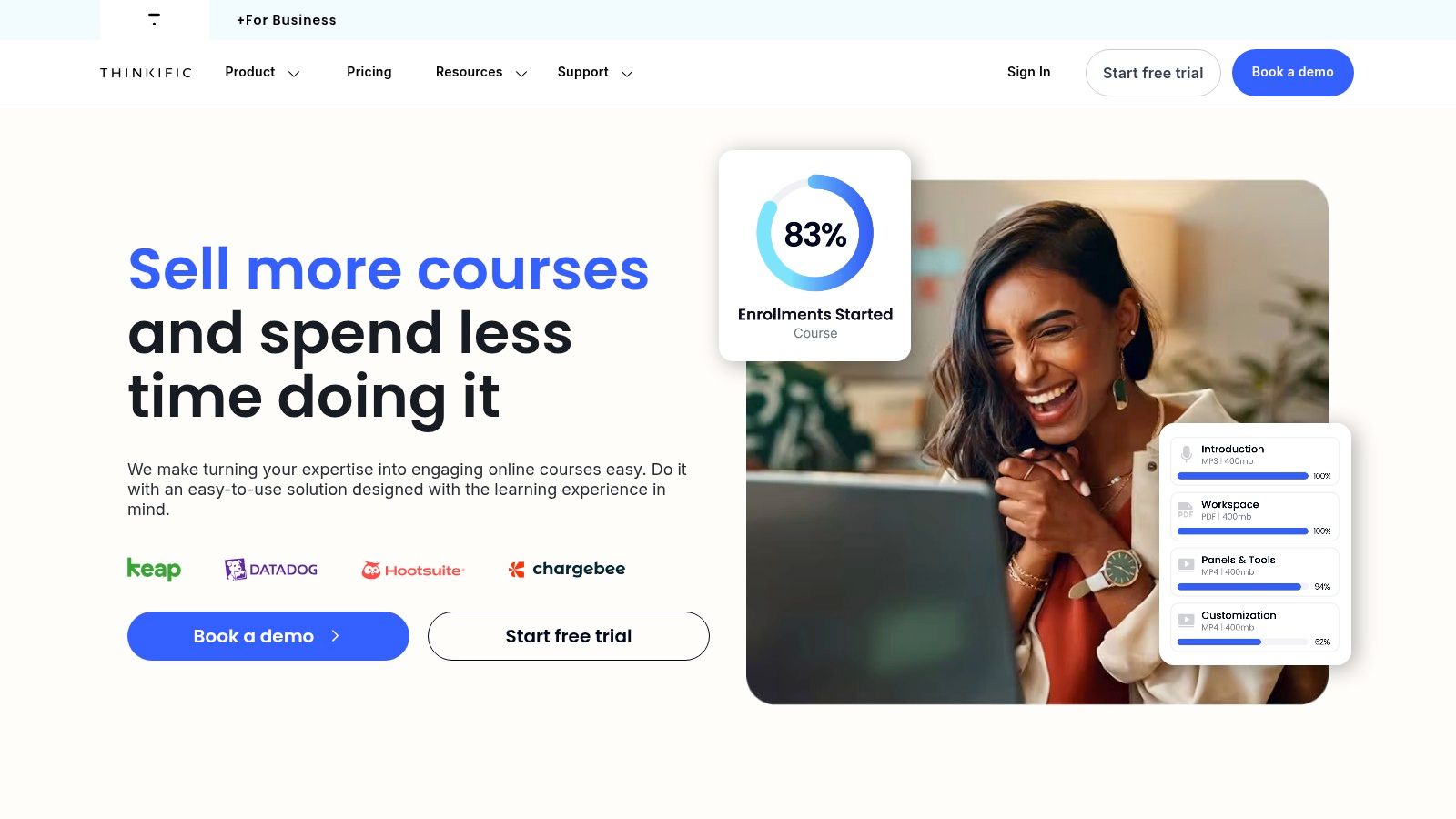
Thinkific is a platform specifically designed for creating and delivering online courses. Its built-in video hosting is a major draw for educators. This makes it a great choice for Shopify store owners and arts and crafts businesses wanting to expand into educational content, workshops, or online courses. The all-in-one platform simplifies the process, allowing you to concentrate on creating great content and engaging your students. You won’t have to juggle multiple services. Thinkific’s unlimited video hosting, even on the free plan, combined with an intuitive interface and a focus on educational content organization, makes it a standout choice.
Thinkific truly shines with features like unlimited video hosting on all pricing tiers. This means you can host a vast library of videos without extra costs. Features like bulk uploading streamline course creation. Video completion tracking helps you monitor student progress. Content dripping and scheduled release options provide structured learning experiences. Custom learning paths with pre-requisites help students progress logically through the material. For Shopify store owners, this provides a smooth integration of educational content related to their products, with the potential to boost sales and cultivate customer loyalty. Imagine offering a free online course showing how to use a specific craft supply you sell.
Thinkific offers a free plan and paid options starting at $39/month. The technical requirements are minimal; a modern web browser is all you need for both course creation and student access. For a more detailed comparison of platforms, check out this guide: Our guide on Thinkific vs. Tevello.
Pros of Using Thinkific
Here's a breakdown of the advantages Thinkific offers:
- No Transaction Fees: You keep all your earnings, no matter which plan you choose.
- Unlimited Students: Grow your audience without limits, even on the free plan.
- Easy-to-Use Interface: Course creation and management are straightforward and user-friendly.
- Organized Learning Environment: Structure your content effectively using custom learning paths and pre-requisites.
Cons of Using Thinkific
While Thinkific offers a lot, it's important to be aware of some potential drawbacks:
- Limited Marketing Tools on Lower Tiers: You might need to use other marketing tools.
- Basic Video Analytics: You can track completion, but in-depth analytics are limited.
- Customization Restrictions: Thinkific offers fewer customization options than some competitors, potentially affecting branding.
- Advanced Features Require Higher Plans: Features like memberships and communities are only available on more expensive plans.
For Shopify store owners and arts and crafts businesses, Thinkific is an accessible and streamlined way to create and host video-based online courses. While the marketing tools on the lower-tier plans might be limited, the platform’s user-friendliness and focus on educational content organization make it an effective tool for monetizing your expertise and engaging your customers. Learn more by visiting the Thinkific website.
8. Panopto
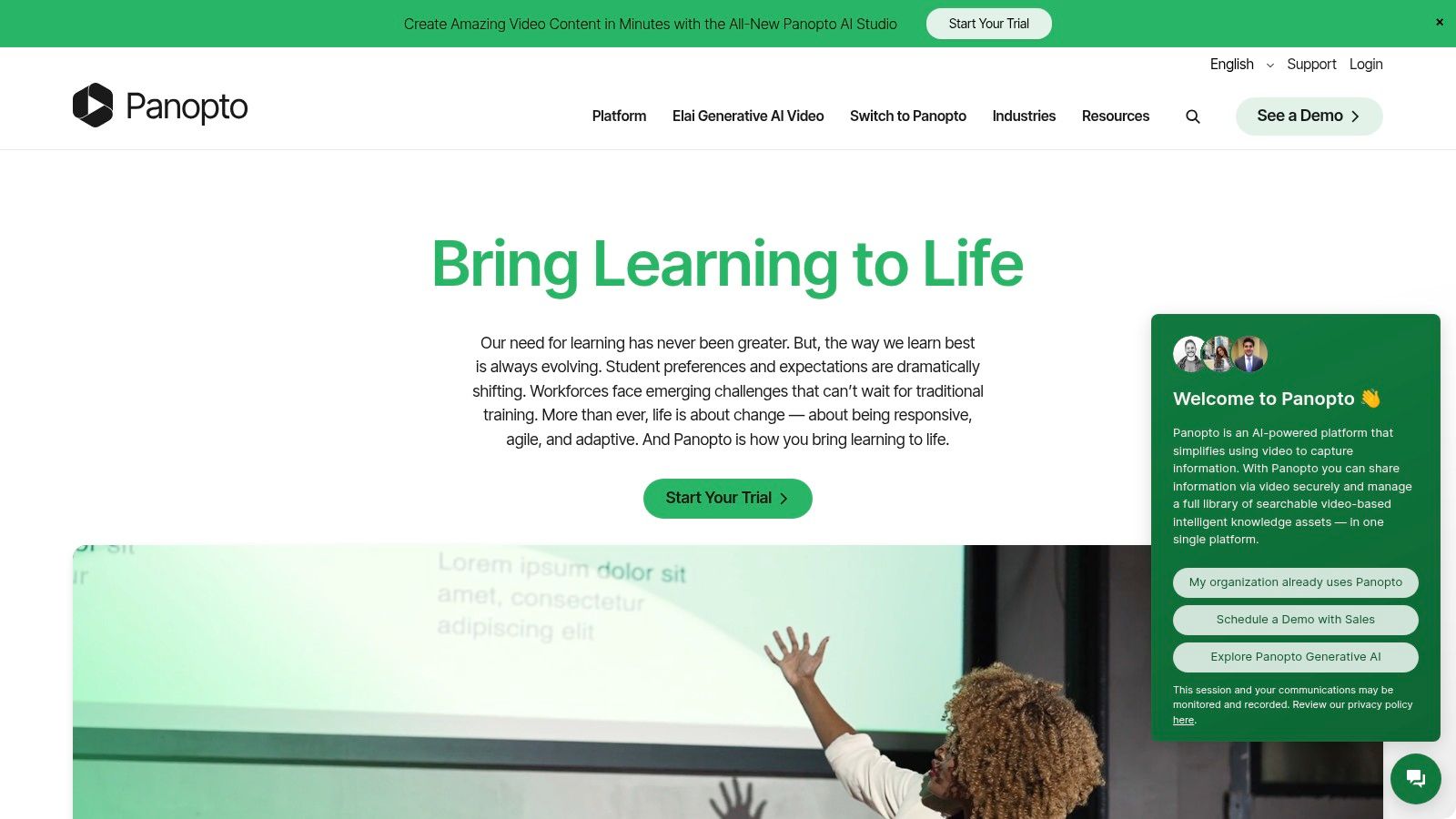
Panopto is a powerful, enterprise-grade video hosting platform. It's designed for educational institutions and corporate training. While its comprehensive features make it attractive for large organizations, its pricing and complexity might not suit individual Shopify store owners or arts and crafts businesses with smaller online courses. However, its exceptional search functionality and deep LMS integrations make it worth considering for businesses that prioritize structured learning and easy access to information.
This makes it a valuable tool for any business prioritizing structured learning and knowledge retrieval.
How Shopify and Arts & Crafts Businesses Can Use Panopto
Panopto's strengths shine in specific scenarios for smaller businesses:
-
Detailed Product Training: If your products or tools are complex, Panopto's inside-video search is invaluable. Customers can quickly locate specific instructions or troubleshooting tips within long tutorial videos. Imagine a customer searching for "how to adjust the tension" in a 30-minute loom weaving video. Panopto pinpoints the exact moment.
-
Comprehensive Online Workshops: For businesses offering structured, multi-part courses, Panopto's LMS integration with platforms like Moodle ensures smooth course delivery and progress tracking. The interactive quizzing feature helps assess learning outcomes.
-
Searchable Knowledge Base: Create a library of training videos for staff or document internal procedures. Panopto’s powerful search allows team members to quickly find relevant information.
Features
-
Smart Search: Search inside videos for any spoken or displayed word. This transforms in-depth training materials.
-
Automated Captioning and Transcription: Improve accessibility and SEO.
-
Multi-Camera Recording and Synchronization: Create professional videos with multiple angles.
-
Interactive Quizzing: Test learner comprehension with quizzes embedded within videos.
-
LMS Integration: Integrates with platforms like Canvas, Blackboard, and Moodle.
Pros and Cons of Panopto
Here's a quick overview of the advantages and disadvantages:
| Pros | Cons |
|---|---|
| Unmatched Inside-Video Search | Higher Price Point |
| Designed for Educational Content Delivery | Complex Setup |
| Robust Analytics for Learning Assessment | Enterprise Focus, Less Agile for Individuals |
| Institutional-Grade Security and Compliance | Limited Marketing and Sales Tools |
Implementing Panopto
-
Consider Panopto: If your courses need structure with strong search capabilities.
-
Budget Concerns: Explore alternatives like Vimeo or YouTube for basic video hosting.
-
Use the Analytics: Track learner engagement and improve your video content.
Website: https://www.panopto.com (Contact Panopto for pricing.)
Panopto may not be ideal for every Shopify store owner or arts and crafts business. But its unique features make it a strong choice for those prioritizing structured learning and easy access to information within their video content. If you need an enterprise-grade solution for online courses, Panopto is worth exploring.
8-Platform Video Hosting Comparison for Online Courses
| Platform | Core Features | UX & Quality | Value Proposition | Unique Features | Target Audience |
|---|---|---|---|---|---|
| 🏆 Tevello | Seamless Shopify integration, courses, community, automated enrollments | 5.0★ (290+ reviews) | Upselling & cross-selling boost 💰; Pricing inquiry | Custom learning paths, multilingual ✨ | Shopify merchants, eCommerce educators 👥 |
| Vimeo | Ad-free streaming, advanced privacy, detailed analytics | Professional viewing ★★★ | High-end features; Premium cost 💰 | Advanced privacy controls, team collaboration ✨ | Pro course creators 👥 |
| Wistia | Customizable player, in-video CTAs, lead generation | Engagement tracking ★★★ | Conversion optimization; Premium pricing 💰 | Turnstile email capture ✨ | Business & course marketers 👥 |
| Teachable | Drag-&-drop course builder, built-in payments, integrated video hosting | Integrated ed-tech ★★ | All-in-one setup; Moderate fees 💰 | White-label options, customizable sales pages ✨ | Online course creators, educators 👥 |
| Kajabi | Complete course ecosystem, marketing automation, website builder | Robust features ★★★ | Comprehensive solution; High investment 💰 | Adaptive video playback, 24/7 support ✨ | Digital entrepreneurs, premium creators 👥 |
| YouTube | Unlimited hosting, live streaming, monetization options | Familiar platform ★★ | Free hosting; Ad revenue dependent 💰 | Massive discovery, mobile-friendly interface ✨ | Broad audience, entry-level educators 👥 |
| Thinkific | Unlimited hosting, intuitive course builder, student tracking | Simple & effective ★★★ | No fees; Flexible tiered pricing 💰 | Content dripping, custom learning paths ✨ | Educators, institutional users 👥 |
| Panopto | Lecture capture, searchable videos, LMS integration | Enterprise-grade ★★★ | Secure & enterprise-ready; Higher pricing 💰 | Smart search, multi-camera sync ✨ | Institutions, corporate trainers 👥 |
Ready to Streamline Your Online Courses?
Choosing the best video hosting for online courses requires careful consideration of your unique needs, budget, and long-term goals. Whether you're a Shopify store owner looking to integrate courses directly into your sales funnel, or an arts and crafts business owner wanting to share expertise through engaging workshops, the right platform is essential. Factors like video quality, student interaction features, marketing tools, and pricing all contribute to your decision.
When evaluating platforms like Tevello, Vimeo, Wistia, Teachable, Kajabi, YouTube, Thinkific, and Panopto, consider the following:
-
Implementation and Getting Started: Some platforms offer more user-friendly interfaces and simpler setup processes. If you're new to online course creation, prioritize ease of use. Look for platforms with comprehensive documentation, tutorials, and readily available support.
-
Budget and Resources: Pricing models vary considerably. Evaluate your budget and anticipated student numbers. Some platforms charge per video, per student, or offer tiered subscriptions. Don't forget to factor in the potential cost of additional software or services, such as video editing software or marketing tools.
-
Integration and Compatibility: For Shopify store owners, seamless integration with your existing eCommerce platform is vital. Make sure the platform you choose integrates smoothly with your email marketing software, payment gateway, and other crucial business tools. For arts and crafts businesses, compatibility with platforms you use to display your work or engage with your audience is essential.
Key Takeaways
-
Prioritize Your Needs: Concentrate on the features that best support your teaching style and business objectives.
-
Consider Your Budget: Find a balance between cost and the value and features provided.
-
Seamless Integration is Essential: Ensure the platform integrates effectively with your current tools.
Looking for a fully integrated solution that not only hosts your high-quality course videos but also enhances your Shopify store? Tevello allows you to seamlessly blend your online courses and community directly within your existing Shopify setup, creating a central hub for selling products and sharing your expertise. Forget juggling multiple platforms and start maximizing your revenue potential with integrated learning paths, interactive workshops, and automated customer onboarding. Boost your sales, engage your customers, and streamline your operations – all within a single platform. Ready to transform your Shopify store into a thriving educational center? Explore the power of Tevello today: https://tevello.com




